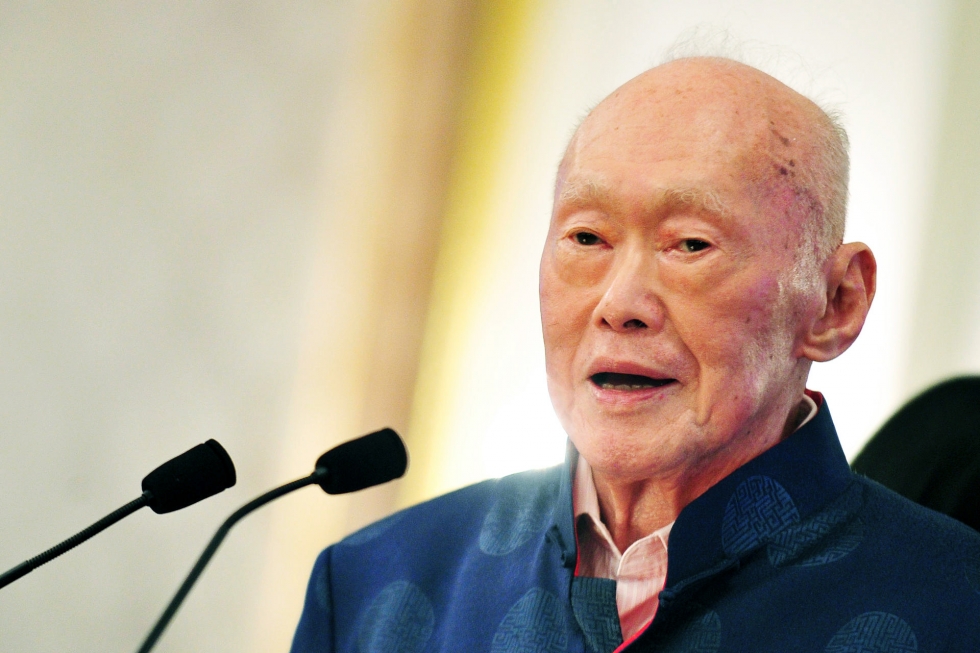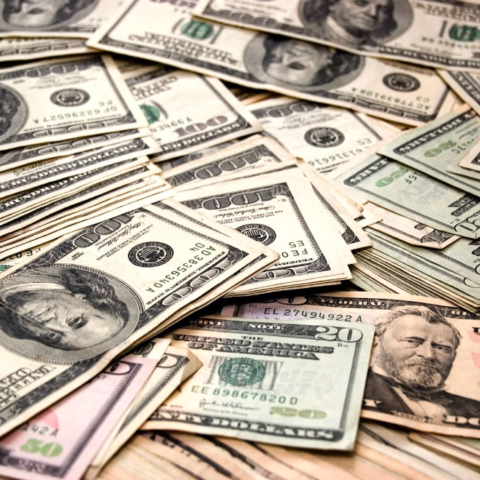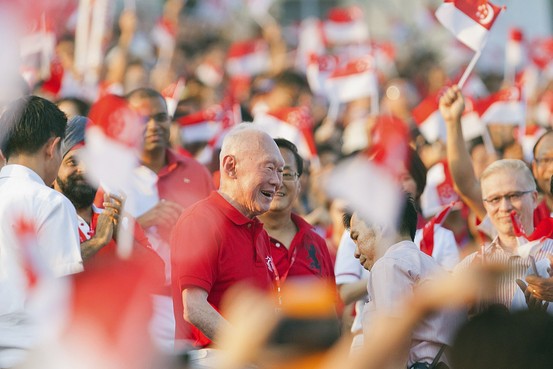
The tiny city-state of Singapore is in mourning. The father of the nation and Prime Minister of 31 years Lee Kuan Yew passed away on March 23, 2015 at the age of 91.
Perhaps the world’s most beloved autocrat, Lee Kuan Yew managed to build a sparkling metropolis from the embittered frontier of the British Empire. Once a soggy colonial holding, the Singapore of today is the result of Prime Minister Lee’s innovative economic and business practices and his “Asian values” that openly reject Western democratic models. Lee Kuan Yew is most famous for his firm control and heavy-handed policies that helped shape Singapore – a miniscule nation with no natural resources and an ethnically fractured community – into one of the most prosperous countries in Asia.
Thousands lined the streets of Singapore, in torrential rain, to say goodbye to Lee Kuan Yew http://t.co/DspAm8vQdf pic.twitter.com/kY2MDBj7dN
— BBC News (World) (@BBCWorld) March 29, 2015
The story of Lee and Singapore’s rise starts at the end of the colonial era when Britain granted Singapore partial sovereignty in 1946. After a decade of legislative councils under the supervision of the British, Singapore hosted elections for a new assembly in 1959. The People’s Action Party rose to power, with Lee Kuan Yew, one of the party’s founders, at the helm. Singapore merged with Malaysia, its neighbor to the north, in 1963 on Lee’s urging to help stimulate economic growth for the miniscule city-state. However, quickly thereafter, ethnic fractionalization threatened to tear the diverse federation apart. With rampant street violence between the proportionally more numerous Chinese in Singapore and the ethnic Malay communities in Malaysia, the Malaysian Parliament voted to oust Singapore in 1965. Independent once again, Singapore began its journey to global prominence despite its lack of infrastructure, its scarce fresh water resources, and its poverty rate, with an annual GDP per capita at less than $320. Lee Kuan Yew, still Prime Minister, led the charge.
Singapore’s history of British colonialism left the nation in a sticky spot. The colonial economy was built solely on the use of the port at the base of the Malay Peninsula, and, with no industrial history, Singapore’s mixed immigrant population had very few specialized skills to diversify the weak economy. Adding to its woes, Singapore never developed a thriving environment of political rights because of its colonial history.
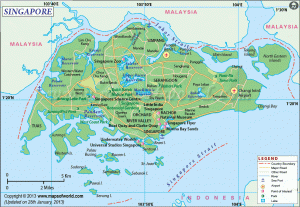
To stimulate investment, Prime Minister Lee Kuan Yew resorted to draconian politics to limit dissent and to ensure that independent unions could never best the power of the National Trade Union Congress, established by the People’s Action Party. Lee Kuan Yew quickly became an aggressive leader and spearheaded an aggressive economic growth campaign.
After studying the success of other post-colonial nations, Lee Kuan Yew chose to focus on land reclamation and a corporate management strategy to develop the small nation. As Prime Minster (and practically CEO of Singapore), it’s no wonder that many quip that Singapore is one of the finest corporations in the world. A lawyer by education, Lee Kuan Yew was no stranger to taking his opponents to court, and rarely did he lose. His micromanagement of the state created one of the most business-friendly manufacturing centers in the world. Singapore was well positioned to make use of its access to international waterways due to its historical function as a port of call.
U.S. and Japanese investment came quickly because of the country’s stability, and the pro-business environment jumpstarted massive economic growth between the 1960s and 1970s. With foreign investment flowed capital and technology that quickly permeated across the city-state. The Prime Minister himself – he didn’t cede power until 1990 – suggested that Singapore’s greatest asset lay in its people and the potential of human capital. With investment continuing to rise, education standards followed suit. Now with a highly literate, advanced population, Singapore’s exports shifted from textiles in the 1970s to a range of advanced engineering technology in the 1990s. Pharmaceuticals, aerospace engineering, medical research, chemicals, and biotechnology have all found their place in Singapore’s economic sectors.
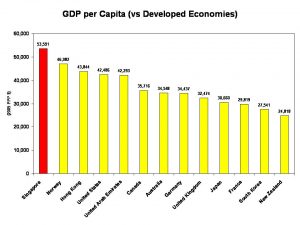
Today, Singapore’s economic success is staggering, and it is one of the freest economies in South East Asia, just behind Hong Kong. Chalk it up to intense free market capitalism, Lee Kuan Yew’s micromanagement, or perhaps both: Singapore defied the odds. Home to the world’s best airport, a state-of-the-art seawater port, a rigid legal infrastructure (serious fines for smoking in public; jail time for importing chewing gum; fines for not flushing public toilets, etc.), neutral diplomacy with the Western and Eastern worlds, sustainable environmental efforts, and more, Singapore is coasting at a GDP per capita above $55,000 USD, ranked third in the world by the International Monetary Fund. In the past five years, over $1 billion in foreign funds have flown through Singapore’s coffers, with a surge of factories being built shortly afterwards. Over 425 individual American corporations are operating within Singapore – a country smaller than Lexington, Kentucky. About one in every six Singaporean households belongs to a millionaire; in 2012, Singapore had the highest concentration of millionaires in the world.
Prime Minister Lee’s policies were anything but Western. Deemed one of the four Asian Tigers, Singapore is notable in the East for intense growth rates, industrialization, low taxation, and high exports. Focusing on free trade, privatization, deregulation, and more, the Western world has been ensnared by this so-called Washington Consensus model of development, particularly following the 2008 financial crisis. Singapore, on the other hand, has demonstrated that perhaps the “Asian way” is just as successful and government regulations are not inherently detrimental. The Confucian values of obedience, social hierarchy, loyalty, and order demonstrate that success is not always found in copying the West. Liberal democracies are chaotic; Singapore may be the exact opposite.
Lee Kuan Yew ensured that the government is critically involved in public services, business regulation, and economic development; the state has a hand in everything from healthcare to education to business. And it’s working. Bloomberg reported that Singapore’s healthcare system was the world’s most efficient in 2014. Infancy mortality rates in Singapore are three times lower than in the United States, murder rates are 24 times higher here than there, and the Singapore’s GDP has grown around six percent on average for the last decade, while the United States has dwelled around two percent. And now, according to the Harvard Business Review, Singapore is one of the most innovative and entrepreneurial countries in the world.
In 2001 under the new Prime Minister Goh Chok Tong, a newly established economic review committee set out to spur entrepreneurialism within the nation. Within a decade of this plan, Singaporeans report that they have accepted risk-taking and failure as essential components of business development, and are, according to the government, altering the culture of Singapore from a culture that shames failure, to a culture that “accepts diversity and failure, and embraces a broad notion of success . . . [forgiving] those who try and fail, and not [humiliating] them or [dampening] their ability to start afresh.”
This sounds like a new Silicon Valley.
Without engaging too deeply in politics, there’s no question that the United States has a tendency to assert the importance of democracy abroad, and promote the capitalistic, laissez-faire ideals of economist Adam Smith. But Singapore routinely discredits this model, and demonstrates the success of alternate development models.
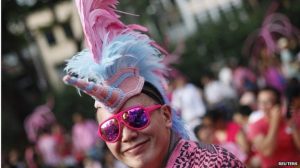
Critics argue that Singapore’s success is at the expense of citizens’ rights: limited freedoms of expression and assembly are based on a legal framework that emphasizes the stability of the multi-ethnic, religiously diverse nation. LGBTQ rights are still non-existent, and the death penalty is alive and actively used. Critics of Singapore may question the costs of economic efficiency. The government actively takes opponents to court in defamation suits, and recently there have been reports of graffiti targeted at the People’s Action Party headquarters, signaling greater discontent amongst the people. In 2011, the People’s Action Party received only 60 percent of the parliamentary vote, considerably less than its historical dominance, with opponents claiming that the party has lost touch with voters’ concerns over rising housing costs and a continual stream of immigrants from China. Perhaps wealth and stability alone are not enough to keep the masses happy. Although highly revered on an international stage, Singapore does have more than few issues to iron out.
But, when the government believes in harnessing the power of human capital and supports the academic and entrepreneurial endeavors of its people, perhaps a few withheld rights are a fair tradeoff for living in a state like Singapore. The economic efficiency of the nation, as well as the resounding growth of the small city-state, is widely attributed to Lee Kuan Yew, the patriarch himself. In the wake of his death, it is no surprise that thousands flocked to his funeral to celebrate the architect of their nation and their unique way of life.
– By Sam Schaffer
